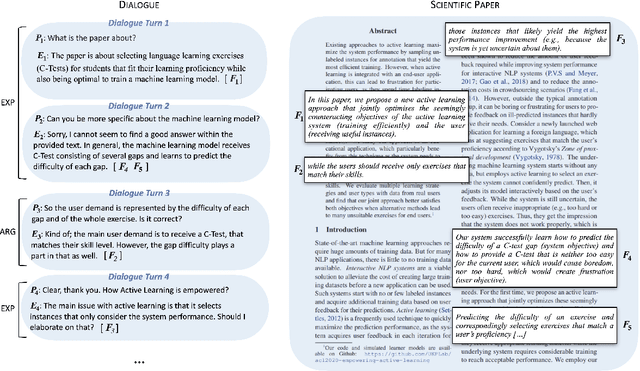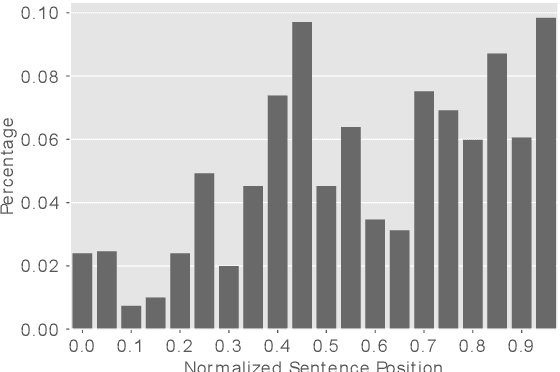Federico Ruggeri
The Alignment Bottleneck in Decomposition-Based Claim Verification
Feb 11, 2026Abstract:Structured claim decomposition is often proposed as a solution for verifying complex, multi-faceted claims, yet empirical results have been inconsistent. We argue that these inconsistencies stem from two overlooked bottlenecks: evidence alignment and sub-claim error profiles. To better understand these factors, we introduce a new dataset of real-world complex claims, featuring temporally bounded evidence and human-annotated sub-claim evidence spans. We evaluate decomposition under two evidence alignment setups: Sub-claim Aligned Evidence (SAE) and Repeated Claim-level Evidence (SRE). Our results reveal that decomposition brings significant performance improvement only when evidence is granular and strictly aligned. By contrast, standard setups that rely on repeated claim-level evidence (SRE) fail to improve and often degrade performance as shown across different datasets and domains (PHEMEPlus, MMM-Fact, COVID-Fact). Furthermore, we demonstrate that in the presence of noisy sub-claim labels, the nature of the error ends up determining downstream robustness. We find that conservative "abstention" significantly reduces error propagation compared to aggressive but incorrect predictions. These findings suggest that future claim decomposition frameworks must prioritize precise evidence synthesis and calibrate the label bias of sub-claim verification models.
The CLEF-2025 CheckThat! Lab: Subjectivity, Fact-Checking, Claim Normalization, and Retrieval
Mar 19, 2025Abstract:The CheckThat! lab aims to advance the development of innovative technologies designed to identify and counteract online disinformation and manipulation efforts across various languages and platforms. The first five editions focused on key tasks in the information verification pipeline, including check-worthiness, evidence retrieval and pairing, and verification. Since the 2023 edition, the lab has expanded its scope to address auxiliary tasks that support research and decision-making in verification. In the 2025 edition, the lab revisits core verification tasks while also considering auxiliary challenges. Task 1 focuses on the identification of subjectivity (a follow-up from CheckThat! 2024), Task 2 addresses claim normalization, Task 3 targets fact-checking numerical claims, and Task 4 explores scientific web discourse processing. These tasks present challenging classification and retrieval problems at both the document and span levels, including multilingual settings.
Interlocking-free Selective Rationalization Through Genetic-based Learning
Dec 13, 2024Abstract:A popular end-to-end architecture for selective rationalization is the select-then-predict pipeline, comprising a generator to extract highlights fed to a predictor. Such a cooperative system suffers from suboptimal equilibrium minima due to the dominance of one of the two modules, a phenomenon known as interlocking. While several contributions aimed at addressing interlocking, they only mitigate its effect, often by introducing feature-based heuristics, sampling, and ad-hoc regularizations. We present GenSPP, the first interlocking-free architecture for selective rationalization that does not require any learning overhead, as the above-mentioned. GenSPP avoids interlocking by performing disjoint training of the generator and predictor via genetic global search. Experiments on a synthetic and a real-world benchmark show that our model outperforms several state-of-the-art competitors.
Untangling Hate Speech Definitions: A Semantic Componential Analysis Across Cultures and Domains
Nov 11, 2024Abstract:Hate speech relies heavily on cultural influences, leading to varying individual interpretations. For that reason, we propose a Semantic Componential Analysis (SCA) framework for a cross-cultural and cross-domain analysis of hate speech definitions. We create the first dataset of definitions derived from five domains: online dictionaries, research papers, Wikipedia articles, legislation, and online platforms, which are later analyzed into semantic components. Our analysis reveals that the components differ from definition to definition, yet many domains borrow definitions from one another without taking into account the target culture. We conduct zero-shot model experiments using our proposed dataset, employing three popular open-sourced LLMs to understand the impact of different definitions on hate speech detection. Our findings indicate that LLMs are sensitive to definitions: responses for hate speech detection change according to the complexity of definitions used in the prompt.
Language is Scary when Over-Analyzed: Unpacking Implied Misogynistic Reasoning with Argumentation Theory-Driven Prompts
Sep 04, 2024



Abstract:We propose misogyny detection as an Argumentative Reasoning task and we investigate the capacity of large language models (LLMs) to understand the implicit reasoning used to convey misogyny in both Italian and English. The central aim is to generate the missing reasoning link between a message and the implied meanings encoding the misogyny. Our study uses argumentation theory as a foundation to form a collection of prompts in both zero-shot and few-shot settings. These prompts integrate different techniques, including chain-of-thought reasoning and augmented knowledge. Our findings show that LLMs fall short on reasoning capabilities about misogynistic comments and that they mostly rely on their implicit knowledge derived from internalized common stereotypes about women to generate implied assumptions, rather than on inductive reasoning.
Let Guidelines Guide You: A Prescriptive Guideline-Centered Data Annotation Methodology
Jun 20, 2024



Abstract:We introduce the Guideline-Centered annotation process, a novel data annotation methodology focused on reporting the annotation guidelines associated with each data sample. We identify three main limitations of the standard prescriptive annotation process and describe how the Guideline-Centered methodology overcomes them by reducing the loss of information in the annotation process and ensuring adherence to guidelines. Additionally, we discuss how the Guideline-Centered enables the reuse of annotated data across multiple tasks at the cost of a single human-annotation process.
Promoting Fairness and Diversity in Speech Datasets for Mental Health and Neurological Disorders Research
Jun 06, 2024



Abstract:Current research in machine learning and artificial intelligence is largely centered on modeling and performance evaluation, less so on data collection. However, recent research demonstrated that limitations and biases in data may negatively impact trustworthiness and reliability. These aspects are particularly impactful on sensitive domains such as mental health and neurological disorders, where speech data are used to develop AI applications aimed at improving the health of patients and supporting healthcare providers. In this paper, we chart the landscape of available speech datasets for this domain, to highlight possible pitfalls and opportunities for improvement and promote fairness and diversity. We present a comprehensive list of desiderata for building speech datasets for mental health and neurological disorders and distill it into a checklist focused on ethical concerns to foster more responsible research.
PejorativITy: Disambiguating Pejorative Epithets to Improve Misogyny Detection in Italian Tweets
Apr 03, 2024



Abstract:Misogyny is often expressed through figurative language. Some neutral words can assume a negative connotation when functioning as pejorative epithets. Disambiguating the meaning of such terms might help the detection of misogyny. In order to address such task, we present PejorativITy, a novel corpus of 1,200 manually annotated Italian tweets for pejorative language at the word level and misogyny at the sentence level. We evaluate the impact of injecting information about disambiguated words into a model targeting misogyny detection. In particular, we explore two different approaches for injection: concatenation of pejorative information and substitution of ambiguous words with univocal terms. Our experimental results, both on our corpus and on two popular benchmarks on Italian tweets, show that both approaches lead to a major classification improvement, indicating that word sense disambiguation is a promising preliminary step for misogyny detection. Furthermore, we investigate LLMs' understanding of pejorative epithets by means of contextual word embeddings analysis and prompting.
A Corpus for Sentence-level Subjectivity Detection on English News Articles
May 29, 2023



Abstract:We present a novel corpus for subjectivity detection at the sentence level. We develop new annotation guidelines for the task, which are not limited to language-specific cues, and apply them to produce a new corpus in English. The corpus consists of 411 subjective and 638 objective sentences extracted from ongoing coverage of political affairs from online news outlets. This new resource paves the way for the development of models for subjectivity detection in English and across other languages, without relying on language-specific tools like lexicons or machine translation. We evaluate state-of-the-art multilingual transformer-based models on the task, both in mono- and cross-lingual settings, the latter with a similar existing corpus in Italian language. We observe that enriching our corpus with resources in other languages improves the results on the task.
ArgSciChat: A Dataset for Argumentative Dialogues on Scientific Papers
Feb 18, 2022



Abstract:The applications of conversational agents for scientific disciplines (as expert domains) are understudied due to the lack of dialogue data to train such agents. While most data collection frameworks, such as Amazon Mechanical Turk, foster data collection for generic domains by connecting crowd workers and task designers, these frameworks are not much optimized for data collection in expert domains. Scientists are rarely present in these frameworks due to their limited time budget. Therefore, we introduce a novel framework to collect dialogues between scientists as domain experts on scientific papers. Our framework lets scientists present their scientific papers as groundings for dialogues and participate in dialogue they like its paper title. We use our framework to collect a novel argumentative dialogue dataset, ArgSciChat. It consists of 498 messages collected from 41 dialogues on 20 scientific papers. Alongside extensive analysis on ArgSciChat, we evaluate a recent conversational agent on our dataset. Experimental results show that this agent poorly performs on ArgSciChat, motivating further research on argumentative scientific agents. We release our framework and the dataset.
 Add to Chrome
Add to Chrome Add to Firefox
Add to Firefox Add to Edge
Add to Edge